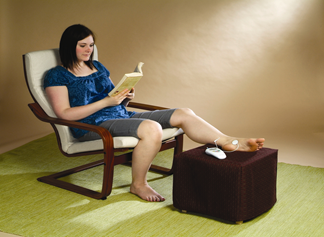- Reference Number: HEY305/2022
- Departments: GI Physiology
- Last Updated: 31 October 2022
For the Treatment of Faecal Urgency and Incontinence
Introduction
This leaflet has been produced to give you general information. Most of your questions should have been answered by this leaflet. It is not intended to replace the discussion between you and the healthcare team, but may act as a starting point for discussion. If after reading it you have any concerns or require further explanation, please discuss this with a member of the healthcare team.
What is PTNS?
You have probably been troubled with faecal urgency or incontinence. Following discussion with your healthcare professional they have suggested PTNS may be a realistic treatment option for you.
Neuromodulation is the use of low voltage electricity to make nerves work better. The tibial nerve is involved with the workings of the pelvic floor and anus. By neuromodulating this nerve, the bowel can work better.
A small slim needle electrode, similar to an acupuncture needle, is temporarily inserted near your ankle. The needle electrode is then connected to a battery powered device which is placed next to the ankle. The device is then turned on and adjusted according to your own response. The feeling is a gentle vibration to the foot.
Each treatment is 30 minutes and takes place in the hospital. There is an initial series of 12 weekly treatments, after which your response to these treatments will be discussed. If successful, further treatments to maintain your results will be required. This is normally 2 treatments every 6 months.
Why do I need PTNS?
PTNS is offered to people who have faecal urgency or incontinence. This is often when other conservative treatments have not worked. By using neuromodulation to the tibial nerve, the function of the anus and pelvic floor may be improved and therefore improve symptoms.
Can there be any complications or risks?
The main risks associated with this procedure are related to the needle or mild electrical current used. Discomfort, pain, redness or numbness may be experienced around the needle insertion site. There may be minor bleeding on withdrawal of the needle. These symptoms if experienced should be short lived. Patients who have heart pacemakers cannot have this treatment.
How do I prepare for PTNS?
Please read the information leaflet. Share the information it contains with your partner and family (if you wish) so that they can be of help and support.
You do not have to prepare for this procedure nor need any recovery time afterwards. You may want to bring a magazine or book to read for the duration of the procedure.
What will happen?
You will be seen in the Department of GI Physiology by one of the team who will explain the procedure to you once more. You do not need to undress but we will need access to your bare feet and ankles. One of your ankles will be selected and the procedure will commence.
Picture of a patient having treatment:

What will happen afterwards?
After the procedure you will be able to return home or to work immediately with no after effects.
Should you require further advice on the issues contained in this leaflet, please do not hesitate to contact the Department of GI Physiology on tel: 01482 624036.
General Advice and Consent
Most of your questions should have been answered by this leaflet, but remember that this is only a starting point for discussion with the healthcare team.
Consent to treatment
Before any doctor, nurse or therapist examines or treats you, they must seek your consent or permission. In order to make a decision, you need to have information from health professionals about the treatment or investigation which is being offered to you. You should always ask them more questions if you do not understand or if you want more information.
The information you receive should be about your condition, the alternatives available to you, and whether it carries risks as well as the benefits. What is important is that your consent is genuine or valid. That means:
- you must be able to give your consent
- you must be given enough information to enable you to make a decision
- you must be acting under your own free will and not under the strong influence of another person
Information about you
We collect and use your information to provide you with care and treatment. As part of your care, information about you will be shared between members of a healthcare team, some of whom you may not meet. Your information may also be used to help train staff, to check the quality of our care, to manage and plan the health service, and to help with research. Wherever possible we use anonymous data.
We may pass on relevant information to other health organisations that provide you with care. All information is treated as strictly confidential and is not given to anyone who does not need it. If you have any concerns please ask your doctor, or the person caring for you.
Under the General Data Protection Regulation and the Data Protection Act 2018 we are responsible for maintaining the confidentiality of any information we hold about you. For further information visit the following page: Confidential Information about You.
If you or your carer needs information about your health and wellbeing and about your care and treatment in a different format, such as large print, braille or audio, due to disability, impairment or sensory loss, please advise a member of staff and this can be arranged.

